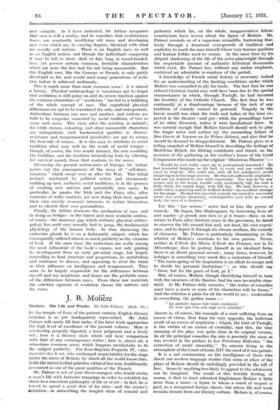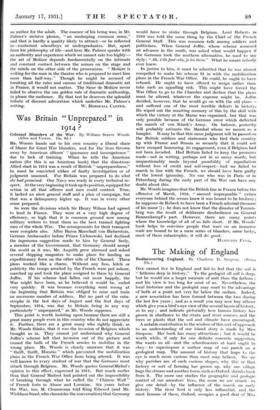J. B. Moliere Moliere. His Life and Works. By John
Palmer. (Bell. 18s.) IN the temple of fame of the present century English literary criticism is as yet inadequately represented. Mr. John Palmer will surely fill that niche, if his later work approaches the high level of excellence of the present volume. Here is
scholarship properly digested, a keen judgment and a lively wit ; here is a literary style which will bear comparison
with that of any contemporary writer ; here is, above all, a robustious common sense, which happens incidentally to fit the subject perfectly. For Jean-Baptiste Poquelin IV, valet- tapissier chez le roi, who exchanged respectability for the stage under the name of Moliere, by which all the world knows him, holds the mirror to that priceless virtue of bon sens, traditionally accounted as one of the great qualities of the French.
Mr. Palmer is not of your thesis-mongers who would clothe a man's life with fantastic trappings in order to establish his claim to a consistent philosophy of life or of art : in fact, he is forced to spend a good deal of his time—and the reader's attention—in unravelling the tangled skein of scandal and
pedantry which his, on the whole, unappreciative fellow- countrymen have woven about the figure of Moliere. Mr. Palmer reminds us of a sagacious armadillo, burrowing fear- lessly through a luxuriant over-growth of tradition and sophistry to reach the man himself whose very human qualities and human foibles need no screen. At the same time by his diligent shadowing of the life of the actor-playwright through the respectable amount of authentic historical documents which exist, Mr. Palmer has, without any undue emphasis, contrived an admirable re-creation of the period.
A knowledge of French social history is necessary indeed for an understanding of the limiting conditions under which Moliere was compelled to ply his trade. The fact that he was refused Christian burial may well have been due to the special
circumstances in which, through Tartuffe, he had incurred the hostility of the Catholic Church. The fact that he was
continually at a disadvantage because of the lack of any tradition of comedy cannot be gainsaid. Tragedy in the heroic mould was what the lords and ladies of the time ex- pected in the theatre—and got—while the groundlings knew of no other diversion, unless it were knockabout farce. It
was natural enough that Moliere himself should seek to play the tragic actor and author (cf. the resounding failure of Don Garcie de Navarre ou Le Prince Jaloux), and also that he should be doomed to disappointment. Mr. Palmer gives us a telling snapshot of Moliere himself in describing the feelings of Madeleine Bejart, his lifelong confidante and friend, on the occasion of the gathering at her mother's house of the Good Companions who made up the original "Illustrious Theatre ":— " Would he ever really come up to professional standard ? He had immortal longings, as she had, to excel, and one could only excel in tragedy. She could not, with all her indulgence, avoid misgiving as to his tragic powers. Ho was not sufficiently emphatic ; had not yet learned to roar with conviction. Nor was he by any means cast in the heroic mould—only moderately tall, his nose a little thick, his mouth large, with full lips. He had, however, a noble mien, a good log and ho walked slowly—an excellent carriage for the stage. He had fine eyes but scarcely the eyes of a successful actor—too serious altogether, contemplative eyes with an inward look, the eyes of a dreamer."
Yet this "too serious" actor had in him the genius of comedy. He began, like Shakespeare, by borrowing from all and sundry—je prends mon bien oit je le trouve—then, on his
return to Paris after thirteen years in the provinces, he dared to observe the life around him and, not least, his own experi-
ence, and to depict it through his chosen medium, the comedy of character. Mr. Palmer is particularly illuminating on the relation of Moliere's creations to his own person. Never, neither in L'Ecole des Mans, L'Ecole des Femmes, nor in Lc Misanthrope, does he portray himself in an idealized form,
there is no direct personal record ; many times, however, he indulges in something very much like a caricature of himself.
"The main-spring of his inspiration is an effort to escape and to deride his personal limitations " ; as who should say "there, but for the grace of God, go I."
But, of course, Moliere, though identifying himself in turn with the creatures of his theatre, had his own invariable stan- dard. As Mr. Palmer drily remarks, "the writer of comedies must have a norm or none of his characters will be funny."
And the criterion is plain for all the world to see ; moderation in everything, the golden mean :—
"La parfait° raison fuit touto extremit6
Et veut que l'on soit sage avec sobriete."
Alceste is, of course, the example of a man suffering from an excess of virtue, Don Juan his very opposite, the ludicrous result of an excess of scepticism : Orgon, the butt of Tartuffe, is the victim of an excess of credulity, and this, the true
meaning of the play, was quite clear in its original version, In all the principal comedies the aim is precisely the same as
was avowed in the preface to Les Precieuses Ridicules, "the correction of social absurdity." To anyone living in the
atmosphere of the Court of Louis XIV the need of it was patent.
It is a sad commentary on the intelligence of those who direct our modern language studies that some or other of the plays of Moliere should be unfailingly provided in the bill of fare. Scarcely anything less likely to appeal to the adolescent can be imagined. The result of this forcible feeding, of course, is that to most educated Englishmen Moliere is little more than a name—a figure to whom a meed of respect is paid, as a recognized foreign classic, but whose life and work remains remote from our literary culture. Moliere is, of course.
an author for the adult. The essence of his being was, in Mr. Palmer's incisive phrase, "an unsleeping common sense," and that is hardly a quality likely to attract—or be reflected in—exuberant schoolboys or undergraduates. But, apart from his philosophy of life—and here Mr. Palmer speaks with an authority and experience which we cannot rate too highly— the art of Moliere depends fundamentally on the intimate and constant contact between the mimes on the stage and the minds on the other side of the proscenium. "Moliere is writing for the man in the theatre who is prepared to meet him more than half-way." Though he might be accused of breaking all the rules and canons of traditional dramatic art in France, it would not matter. The Sieur de Moliere never failed to observe the one golden rule of dramatic authorship, to please the audience. By that test he deserves the splendid tribute of discreet admiration which underlies Mr. Palmer's





































 Previous page
Previous page